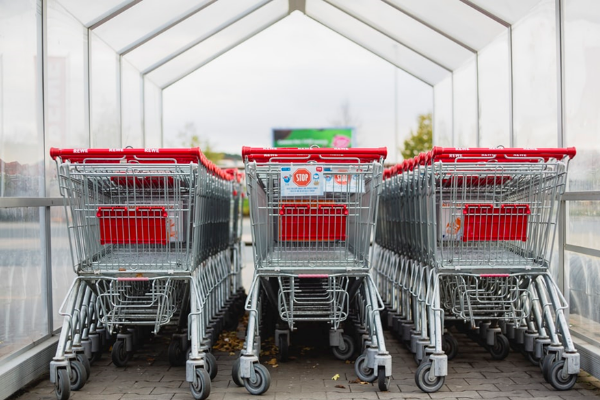Will the top-up-shop generation be converted to the weekly shop of yore?
Remember… ‘popping in’ to a supermarket to pick up a few things? The freedom to spontaneously plan a meal and source the ingredients 30 mins before you start cooking? It being totally irresponsible to map out all your weekly meals on Monday, due to the threat of spontaneous weekday dinner dates and a convenient lunchtime Pret on every corner? We wouldn’t want to contribute to the food waste crisis, would we?
But now… we have been ordered to bend our habits and become weekly-food-shoppers – nay, fortnightly-food-shoppers for the most virtuous among us. We have one shot to stock up our cupboard, fridges and freezers with as many essentials as possible, and as many non-essentials as are left. It’s the comeback of the shopping list, the re-birth of weekly meal planning and portion control, and the dawn of queuing for 30 minutes to get into Lidl.
For many top-up-shoppers – particularly those inner-city dwellers and daily commuters – the weekly food shop is a distant memory from a simpler time, or something they remember only through the eyes of their childhood self as they followed mum & dad up and down the aisles. Many don’t even know where to find the trolleys in a supermarket.
Not only has the top-up-shopper adapted to smaller, more frequent shopping trips at a variety of different supermarkets, but their cooking and eating habits have followed suit. They have become accustomed to loosely planning meals around ultimate convenience and on-demand supplies. So, the change extends further than frequency of shopping: it’s as much about how they eat and how they cook, too.
The shopping list itself has also changed. We no longer have the luxury to shop for small portions of exotic ingredients, or a couple of ready meals a week. We must shop to batch cook and here comes the feeling of Ready Steady Cook meets The Hunger Games, as we get ready to drop our plans at the door, scramble for what’s left and prepare for some questionable ingredients swapping and creative license with our recipes.
We’re also seeing supermarket brand perceptions come to the fore. In these times of uncertainty, shoppers are flocking to the reliable safe havens of Sainsbury’s and Tesco’s, and also Lidl and Aldi assuming that discounters will have their restocking game on point. Anecdotally through my friends’ habits I’m seeing the idea of a Waitrose or M&S ‘treat’ shop turn from a low-level perk of the day to a full-blown highlight of the week.
So what might the long term implications on shopper habits be?
It’s unlikely that serial top-up shoppers will be fully converted to regular weekly shops in the long term, but we might see them appreciate a different meaning of ‘convenient’ when it comes to their cupboards. Perhaps having a fully stocked fridge and knowing exactly what needs to be cooked throughout the week will start to offer superior convenience to some, above and beyond having to think about food 2, 3 or 4 times a week. It might also cause others to question whether spontaneity is really all it’s cracked up to be.
For me, there’s something reassuring and nostalgic about filling up a trolley with food and knowing I’ve become self-sufficient for at least the next 7 days. I enjoy knowing that I’ll use up everything I’ve bought, rather than fearing that yet another bag of spinach will end up in the bin by Thursday. There’s also a great deal of satisfaction to be gained from masterminding new ways to combine limited sets of ingredients.
At a more macro level, this is a very revealing time for how consumers genuinely see brands, and so now could be the time to drive new perceptions. Perhaps Aldi and Lidl will finally be able to prove their quality to more people, and Waitrose may finally learn what should and shouldn’t fall under their ‘Essentials’ range. M&S might be able to demonstrate their value, beyond snacks and sandwiches, as a weekly shop destination and leverage their position in the price war. While supermarket store data will be a melting pot of chaotic panic, where consumers ultimately flock to, and what they prioritise in their shopping, will give a whole new perspective.
Personally, I’ll miss the space in store when the shop is only half full – no basket bumping, no elbow shoving and no blocked aisles – but whether I’d voluntarily queue for 30 minutes for it is another question.
For more information or suggestions, contact lucinda.toole@thevalueengineers.com


